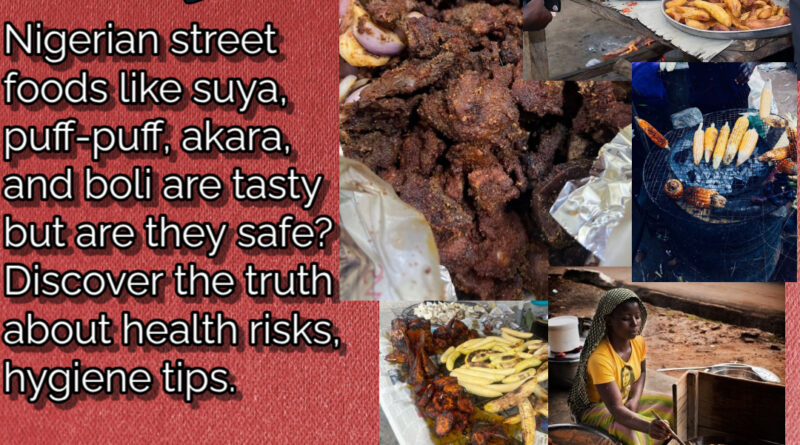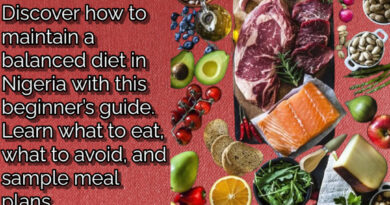Nigerian Street Foods: The Truth About Their Safety and Health Risks (2025 Guide)
Street food is a vital part of Nigerian culture. From the bustling streets of Lagos to quiet towns in Enugu, vendors sell tasty and affordable meals like suya, puff-puff, boli, akara, roasted corn, and meat pies. These foods bring comfort, flavor, and community.
But one question often lingers: Are Nigerian street foods truly safe for our health?
This post dives into the reality looking at the nutritional benefits, hidden risks, and smart ways to enjoy street foods without harming your health.
Why Nigerians Love Street Food
1. Affordability – Street foods are cheap and accessible.
2. Convenience – Quick meals for busy students, workers, and travelers.
3. Taste & Variety – Spicy suya, crunchy puff-puff, roasted plantain (boli) — flavors you can’t resist.
4. Cultural Identity – Street food is part of Nigerian lifestyle and gatherings.
Related Read: Affordable Nigerian Fruits That Prevent Lifestyle Diseases
Nutritional Side of Popular Nigerian Street Foods
Let’s look at what you’re really eating:
1. Suya (Grilled Spiced Meat)
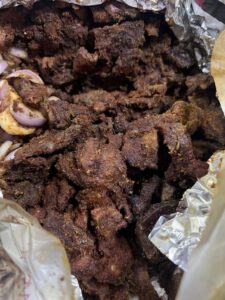
Pros: High in protein, rich in iron.
Cons: Often over-grilled, which can produce harmful compounds. Excess oil and pepper mix may irritate the stomach.
2. Puff-Puff (Deep-Fried Dough Balls)

Pros: Delicious and filling.
Cons: High in refined carbs and oil → contributes to weight gain and high cholesterol.
3. Akara (Bean Cakes)

Pros: Good source of plant-based protein and fiber.
Cons: Deep-fried, which increases fat intake.
4. Boli (Roasted Plantain)
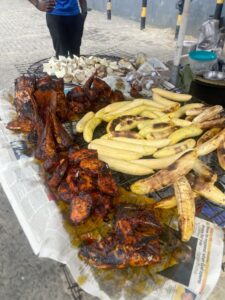
Pros: Rich in potassium, vitamin C, and fiber. Healthy when roasted plain.
Cons: Sometimes served with too much oil or salted groundnut paste.
5. Roasted Corn & Pear
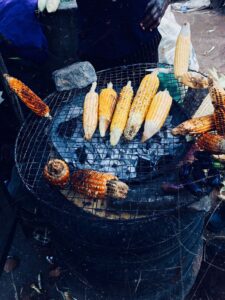
Pros: High in fiber, antioxidants, and vitamins.
Cons: Usually safe, but hygiene around preparation matters.
Health Risks of Nigerian Street Foods
While many street foods are nutritious, problems often arise from:
- Hygiene Issues: Vendors may cook in dusty areas with poor sanitation.
- Overuse of Oil: Deep frying increases calories and unhealthy fats.
- Food Contamination: Poor storage may lead to foodborne diseases.
- Over-grilling: Burnt meats like suya can release harmful carcinogens.
According to the World Health Organization (WHO), unsafe food contributes to over 600 million cases of foodborne illnesses worldwide every year.
How to Enjoy Nigerian Street Foods Safely
1. Choose Clean Vendors: Buy from sellers with proper hygiene and clean stalls.
2. Eat Fresh: Avoid foods that have been sitting out too long.
3. Balance Your Plate: Pair street foods with fruits or vegetables.
Example: Enjoy suya with cucumber, onions, or tomatoes.
4. Limit Fried Foods: Reduce intake of puff-puff, buns, and meat pies.
5. Stay Hydrated: Drink water instead of sodas when eating street snacks.
Related Read: Beginner’s Guide to a Balanced Diet in Nigeria
Healthy Alternatives to Street Foods
If you love street foods but want healthier options, try:
- Grilled fish with pepper sauce instead of suya with excess oil
- Roasted plantain (boli) with vegetables instead of oily fried snacks
- Homemade akara baked in an air fryer instead of deep frying
- Fruit bowls (pawpaw, watermelon, pineapple) instead of soft drinks
For more inspiration, see Healthy Nigerian Breakfast Ideas to Start Your Day.
Final Thoughts
Nigerian street foods are not “bad” — they are part of our tradition. The real issue is moderation and safety. By choosing cleaner vendors, eating in balance, and limiting deep-fried snacks, you can enjoy the rich flavors of street foods without risking your health.
Remember: It’s not about avoiding street foods completely, but about making smart, safe, and balanced choices
For further reading, see Healthline’s guide on street food safety.

